
Manage
your time
How to work more effectively
A & C Black London
Revised edition first published in Great Britain 2010
This electronic edition published 2010 by A & C Black Publishers Ltd
A & C Black Publishers Ltd, 36 Soho Square, London W1D 3QY
www.acblack.com
Copyright A & C Black Publishers Ltd, 2010
First edition 2004 Bloomsbury Publishing, 2004
Reprinted 2007 by A & C Black Publishers Ltd
All rights reserved. You may not copy, distribute, transmit, reproduce or otherwise make available this publication (or any part of it) in any form, or by any means (including without limitation electronic, digital, optical, mechanical, photocopying, printing, recording or otherwise), without the prior written permission of the publisher. Any person who does any unauthorised act in relation to this publication may be liable to criminal prosecution and civil claims for damages.
No responsibility for loss caused to any individual or organisation acting or refraining from action as a result of the material in this publication can be accepted by A & C Black Publishers Ltd or the authors.
A CIP catalogue record for this book is available from the British Library.
Print ISBN: 9-781-4081-2800-82
Electronic ISBN: 9-781-4081-2801-5
Visit www.acblack.com to find out more about our authors and their books.
You will find extracts, authors interviews, author events and you can sign up for newsletters to be the first to hear about our latest releases and special offers.
Contents

Answer the questions and work out your time management profile, then read the guidance points for ideas on how to make more effective use of your time.

How often do your tasks take longer than expected?
a) Hardly ever b) Sometimes c) Regularly
How often do you clear out your desk and e-mails?
a) Regularly b) Seldom c) Hardly ever
How would you rate your delegating skills?
a) Good b) Average c) Poor
When you plan a meeting do you schedule in extra time in case it overruns?
a) Always b) Sometimes c) Never
How often do you work late?
a) Hardly ever b) Sometimes c) Almost always
How often do you make commitments that you cant stick to?
a) Hardly ever b) Sometimes c) Regularly
How often do you say no when asked to do things you have no time for? have no time for?
a) Regularly b) Sometimes c) Hardly ever
When given a task, do you ask for a deadline?
a) Always b) Sometimes c) Never
How often do you schedule in time for yourself?
a) Every day b) Every week c) Never
How do you react when someone chases you for a project that you have put on the back burner?
a) Explain why I had to prioritise other jobs
b) Feel guilty that it has been delayed and do it ASAP
c) Panic I had almost forgotten about it
How do you plan your daily tasks?
a) I write out a daily schedule and stick to it
b) I make a list of the most important tasks and hope to remember the others
c) I tackle jobs as they come up
What do you do when faced with many projects?
a) Get on with the most important ones first
b) Choose the most interesting job and start on that
c) Start several tasks and continue with the easiest one
How organised is your work space?
a) Very. I know where everything is.
b) Fairly. I have been known to lose things.
c) Not at all. I dont think about the state of my desk!
a = 1, b = 2 and c = Now add up your scores.
Chapter is useful to everyone as it will help build awareness of the ways in which you spend your time, and of pockets of lost time that you can regain.
 1320: You manage your time well already, but remember to leave space for self-development, and time to switch off its possible you have become over-efficient or inflexible! Chapter gives you hints on managing your worklife balance. It is also important not to be too controlling remember to delegate so others can develop their skills too as well as relieve the burden on you (Chapter ).
1320: You manage your time well already, but remember to leave space for self-development, and time to switch off its possible you have become over-efficient or inflexible! Chapter gives you hints on managing your worklife balance. It is also important not to be too controlling remember to delegate so others can develop their skills too as well as relieve the burden on you (Chapter ).
 2131: You have a reasonably balanced approach to your working life, but make sure your good intentions regarding time management come to fruition. Conduct a time audit (Chapter ) and avoid spending long hours at work as this will end up making you tired and less efficient. To make the best use of your day, manage the time you spend in meetings (Chapter ) and learn how to keep on top of the many e-mails that come your way (Chapter ).
2131: You have a reasonably balanced approach to your working life, but make sure your good intentions regarding time management come to fruition. Conduct a time audit (Chapter ) and avoid spending long hours at work as this will end up making you tired and less efficient. To make the best use of your day, manage the time you spend in meetings (Chapter ) and learn how to keep on top of the many e-mails that come your way (Chapter ).
 3239: Youre at risk of becoming exhausted and doing a bad job because your time is being used so inefficiently. You need to make major changes in the way you work. Dont underestimate how long tasks will take wishful thinking means nothing when youre about to miss a deadline! Learn to manage both e-mails and information by reading Chapters and . Chapter will help you develop decision-making skills so you dont waste time procrastinating.
3239: Youre at risk of becoming exhausted and doing a bad job because your time is being used so inefficiently. You need to make major changes in the way you work. Dont underestimate how long tasks will take wishful thinking means nothing when youre about to miss a deadline! Learn to manage both e-mails and information by reading Chapters and . Chapter will help you develop decision-making skills so you dont waste time procrastinating.
Organising your time
Time management is about making every moment effective by being truly focused and not dividing your energies by worrying about the past or future. However, its still important to be able to keep the past, present and future in perspective so that you can plan and prioritise effectively. In this way youre able to set tasks in the right context. This gives a sense of order, structure and security for those who are dependent upon your time management skills.
In our working lives, time is the one thing that is in ever increasing demand. Many tools are now available that offer instant access to information and each other, the idea being that more time is released for increased efficiency and productivity. Although these tools are designed to save time, they can be so complex that they use up a great deal of time and as a result put additional pressures on managers.
Step one: Conduct a time audit
 As a first step towards organising your time well, do a time audit on your life. What is the balance between the demands that are placed upon you at work and the obligations and pleasures that define your private life? Does this balance satisfy you, or do you find yourself sacrificing one activity or part of your life for another?
As a first step towards organising your time well, do a time audit on your life. What is the balance between the demands that are placed upon you at work and the obligations and pleasures that define your private life? Does this balance satisfy you, or do you find yourself sacrificing one activity or part of your life for another?
The key to good time management is being aware of the world in which you live and the interrelationships between the component parts, then choosing how you divide your time between each one.
How to do a time audit
Take a large sheet of paper and write your name at the centre.
Place words around your name that represent the demands upon your life. Include contracted work hours, travelling/commuting time, social hours at work lunches, dinners, and post-work socialising and family commitments, remembering that your time demands are likely to increase according to the number of children/dependents that you have. Also include your wider family and friends, sporting or fitness activities, socialising time and time spent on hobbies or areas of personal interest.
Next page
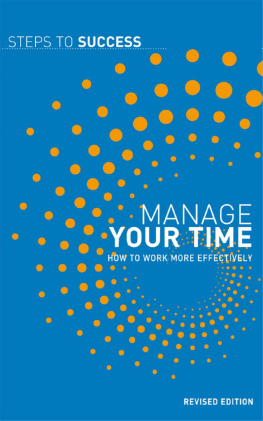




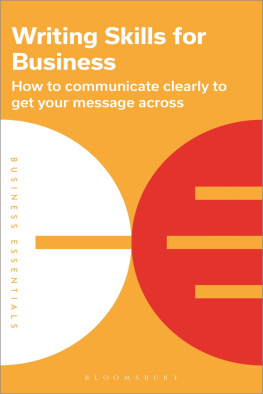



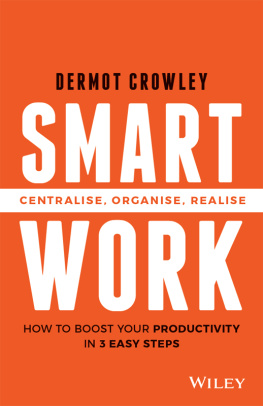
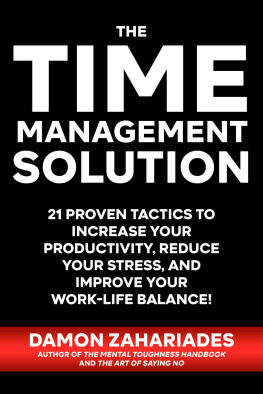
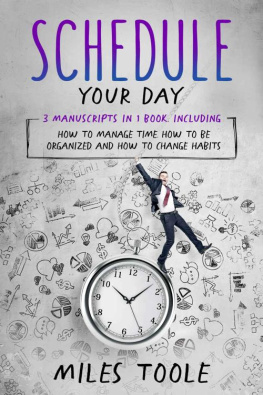






 1320: You manage your time well already, but remember to leave space for self-development, and time to switch off its possible you have become over-efficient or inflexible! Chapter gives you hints on managing your worklife balance. It is also important not to be too controlling remember to delegate so others can develop their skills too as well as relieve the burden on you (Chapter ).
1320: You manage your time well already, but remember to leave space for self-development, and time to switch off its possible you have become over-efficient or inflexible! Chapter gives you hints on managing your worklife balance. It is also important not to be too controlling remember to delegate so others can develop their skills too as well as relieve the burden on you (Chapter ). As a first step towards organising your time well, do a time audit on your life. What is the balance between the demands that are placed upon you at work and the obligations and pleasures that define your private life? Does this balance satisfy you, or do you find yourself sacrificing one activity or part of your life for another?
As a first step towards organising your time well, do a time audit on your life. What is the balance between the demands that are placed upon you at work and the obligations and pleasures that define your private life? Does this balance satisfy you, or do you find yourself sacrificing one activity or part of your life for another?